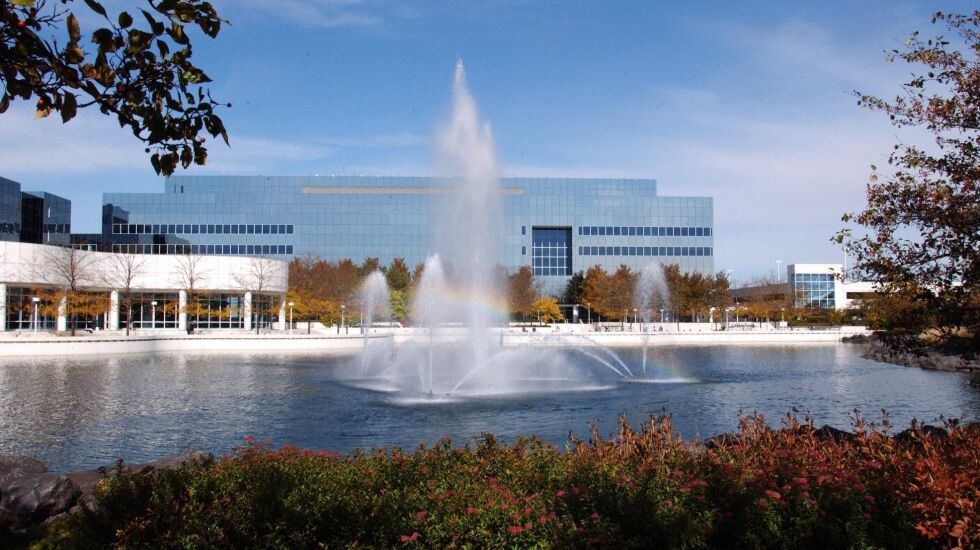
As you approach from the Jane Addams Tollway, you can still see it spread over the Illinois flatlands, a monument to corporate ambition from another time.
It’s the former Sears headquarters in Hoffman Estates, upon which much capital — financial and political — was expended. The former Sears, Roebuck & Co. moved there in 1992 from downtown Chicago, its executives wanting a bucolic setting for more than 5,000 employees. They also seized a chance to wring millions of dollars from state and local governments.
With the benefit of hindsight, anyone today can look back at those plans and realize Sears was trying to create a freshened and white-collar version of George Pullman’s old “company town.”
Across its 274 acres near I-90 and Route 59 were a convenience store, day care, dry cleaners, health club and cafeteria with professional chefs. The place had ponds, a fountain and walking trails. The executives’ hope was that employees would buy homes nearby and be deeply loyal to the company.
Sears couldn’t keep its end of the bargain as the Walmarts and Amazons consumed its business. It continually cut jobs, falling below employment guarantees it gave the state as a condition for subsidies, until the suburban Shangri-La became a husk.
Around the middle of this year, what’s left of Sears agreed to sell 197 acres, most of the property, to Compass Datacenters of Dallas.
In a sign Compass was serious, the $194 million sale closed quickly, in September. Compass has been mum about its plans since then and has yet to bring plans to officials in Hoffman Estates, said village manager Eric Palm. The company could not be reached for comment last week.
But it’s unlikely Compass will have much use for the seven interconnected buildings and their amenities. Offices are out of vogue. The land is the thing. Data centers are built for equipment, not people, and are designed for heavy floor loads. Windows can be sparse, unless local design standards demand them. Compass has gotten a $367 million loan from Citizens Bank to cover future work on the property.
A source said Compass is planning something that could be classified as a mega project, providing about 250 megawatts of power for users, typically multiple companies that need to manage internet data. It’s similar in size to projects the company has in the Dallas-Fort Worth and Phoenix areas.
The project is likely to get a warm reception from Hoffman Estates officials. “We welcome data centers,” Palm said. “We changed our zoning to make data centers a permitted use in certain districts.”
They come with some baggage, certainly. Data centers contain relatively few jobs, so the old Sears property will have nothing like the population that used to work there. But Palm said the jobs that will be created are skilled and well-compensated.
Data centers don’t generate much demand for public services, he said. And while the buildings can consume massive amounts of power and water to keep the gear running and cool, that’s good for local utility tax income.
“It’s a net positive for the municipality,” Palm said. “We see data centers as part of a tech segment we really didn’t have before.”
He said it’s unlikely a portion of the property will be zoned for another use, such as retail or residential. Security needs of data centers tend to rule those out, Palm said.
Hoffman Estates Mayor Bill McLeod put out a statement about the sale of the Sears land. “Although still preliminary, the investment by Compass will be in the billions of dollars and will have positive effects for our community for years to come,” he said.
The town’s data center push helped it land Microsoft, which is adding to property at 2200 Lakewood Boulevard and plans a two-building complex, maybe a third.
The real estate firm Cushman & Wakefield has identified the Chicago area as among the leading U.S. markets for growth in data centers. “The demand for data center space remains high, fueled by the significant needs of hyperscalers looking to secure large capacities of space — Microsoft, Oracle, Google, AWS, Meta, Apple and ByteDance are all currently active in the market,” according to an October report.
Chicago — the city proper — has locations in the data center mix. Suburbs active in the market include Elk Grove Village and Itasca, with old industrial land near O’Hare Airport being in demand.
One challenge, according to Cushman’s report, is power availability. ComEd has been expanding to serve these deals, but some buildings may have to wait until 2025 to 2028 to get online, it said.
As for the old Sears site, look for the wrecking balls to swing one of these days.
The retailer couldn’t keep up with the internet. Now the internet’s innards are taking over but with fewer humans present. Technology connects us in one way but leaves us strangely disconnected in another.







